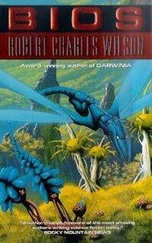AXIS
Robert Charles Wilson
It is necessary that things should pass away into that from which they are born. For things must pay one another the penalty and compensation for their injustice according to the ordinance of time.
—Anaximander
PART ONE — THE 34th OF AUGUST
In the summer of his twelfth year—the summer the stars began to fall from the sky—the boy Isaac discovered that he could tell east from west with his eyes closed.
Isaac lived at the edge of the Great Inland Desert, on the continent of Equatoria, on the planet that had been appended to the Earth by the inscrutable beings called the Hypotheticals. People had given the planet a whole panoply of grandiose or mythological or coolly scientific names, but most simply called it the New World, in any of a hundred or more languages, or Equatoria, after its most widely settled continent. These were things Isaac had learned in what passed for school.
He lived in a compound of brick and adobe, far from the nearest town. He was the only child at the settlement. The adults with whom he lived preferred to keep a careful distance between themselves and the rest of the world. They were special, in ways they were reluctant to discuss. Isaac, too, was special. They had told him so, many times. But he wasn't sure he believed them. He didn't feel special. Often he felt much less than special.
Occasionally the adults, especially Dr. Dvali or Mrs. Rebka, asked Isaac whether he was lonely. He wasn't. He had books, he had the video library to fill his time. He was a student, and he learned at his own pace—steadily if not quickly. In this, Isaac suspected, he was a disappointment to his keepers. But the books and videos and lessons filled his time, and when they were unavailable there was the natural world around him, which had become a kind of mute, indifferent friend: the mountains, gray and green and brown, sloping down to this arid plain, the edge of the desert hinterland, a curdled landscape of rock and sand. Few things grew here, since the rain came only in the first months of spring and sparsely even then. In the dry washes there were lumpish plants with prosaic names: barrel cucumbers, leather vines. In the courtyard of the compound a native garden had been planted, cactus feathery with purple flowers, tall nevergreens with weblike blossoms that extracted moisture from the air. Sometimes a man named Raj irrigated the garden from a pump that ran deep into the earth, and on those mornings the air smelled of mineral-rich water: a steely scent that carried for kilometers. On watering day, rock shrews would burrow under the fence and tumble comically across the tiled courtyard.
Isaac's days passed in gentle sameness early in the summer of his twelfth year, as his days had always passed, but that sleepy peace came to an end the day the old woman arrived.
She came, remarkably, on foot.
Isaac had left the compound that afternoon and climbed a small distance up the foothills, to a granite shelf that jutted from the slope of a ridge like a ship's prow from a pebbly sea. The afternoon sun had warmed the rock to a fine, fierce heat. Isaac, with his wide-brimmed hat and white cotton shirt to protect him from the burning light, sat under the lip of the ridge where there was still shade, watching the horizon. The desert rippled in rising waves of furnace air. He was alone and motionless—afloat in heat, a castaway on a sere raft of stone—when the woman appeared. At first she was just a dot down the unpaved road that led from the distant towns where Isaac's keepers went to buy food and supplies. She moved slowly, or seemed to. Nearly an hour passed before he could identify her as a woman—then an old woman—then an old woman with a pack on her back, a bow-legged posture, and a dogged, determined stride. She wore a white robe and a white sun hat.
The road passed close to this rock, almost directly beneath it, and Isaac, who didn't want to be seen, though he could not say why, scooted behind a boulder and crouched there as she approached. He closed his eyes and imagined he felt the bulk and weight of the land beneath him, the old woman's two feet tickling the skin of the desert like a beetle on the body of a slumbering giant. (And he felt another presence, deep in that earth, a quiescent behemoth stirring in its long sleep far to the west…)
The old woman paused beneath the shelf of rock as if she could see him in his hiding place. Isaac was aware of the break in the rhythm of her shuffling steps. Or maybe she had innocently paused to sip water from a canteen. She said nothing. Isaac held himself very still, something he was good at.
Then her steps resumed. She walked on, leaving the road where a trail bent toward the compound. Isaac lifted his head and looked after her. She was many meters away now, the long light of the afternoon drawing her shadow alongside her like a leggy caricature. As soon as he saw her she paused and turned back, and for a moment it seemed as if their eyes met, and Isaac hastily ducked away, uncertain whether he had been seen. He was startled by the accuracy of her gaze and he remained hidden for a long time, until the sunlight angled deep into the mountain passes. He hid even from himself, quiet as a fish in a pool of memory and thought.
The old woman reached the compound's gates and went inside and stayed there. Before the sky grew wholly dark, Isaac followed her. He wondered if he would be introduced to the woman, perhaps at dinner.
Very few outsiders came to the compound. Of those who came, most came to stay.
* * * * *
After Isaac had bathed and put on clean clothes he went to the dining room.
This was where the entire community, all thirty of the adults, gathered every evening. Morning and afternoon meals were impromptu, could be taken at any time as long as you were willing to do your own work in the kitchen, but dinner was a collective effort, always crowded, inevitably noisy.
Usually Isaac enjoyed hearing the adults talk among themselves, though he seldom understood what they said unless it was trivial: whose turn it was to go to town for provisions, how a roof might be repaired or a well improved. More often, since the adults were mainly scientists and theoreticians, their talk turned to abstract matters. Listening, Isaac had retained few of the details of their work but something of its general content. There was always talk of time and stars and the Hypotheticals, of technology and biology, of evolution and transformation. Although these conversations usually pivoted on words he couldn't understand, they had a fine and lofty sound about them. The debates—were the Hypotheticals properly called beings, conscious entities, or were they some vast and mindless process?—often grew heated, philosophies defended and attacked like military objectives. It was as if in some nearby but inaccessible room the universe itself was being taken apart and reassembled.
Tonight the murmur was subdued. There was a newcomer present: the old woman from the road. Isaac, bashfully taking a seat between Dr. Dvali and Mrs. Rebka, cast furtive glances at her. She did not return them; in fact she seemed indifferent to his presence at the table. When the opportunity arose, Isaac studied her face.
She was even older than he had guessed. Her skin was dark and skeined with wrinkles. Her eyes, bright and liquid, peered out from skully chambers. She held her knife and fork in long, fragile fingers. Her palms were pale. She had changed out of her desert garb into clothing more like what the other adults wore: jeans and a pale yellow cotton shirt. Her hair was thin and cut close to the scalp. She wore no rings or necklaces. In the crook of one elbow was a patch of cotton held down with surgical tape: Mrs. Rebka, the community physician, must already have taken a blood sample from her. But that happened to every newcomer. Isaac wondered if Mrs. Rebka had had a hard time finding a vein in that small sinewy arm. He wondered what the blood test had been meant to detect, and whether Mrs. Rebka had found what she was looking for.
Читать дальше












